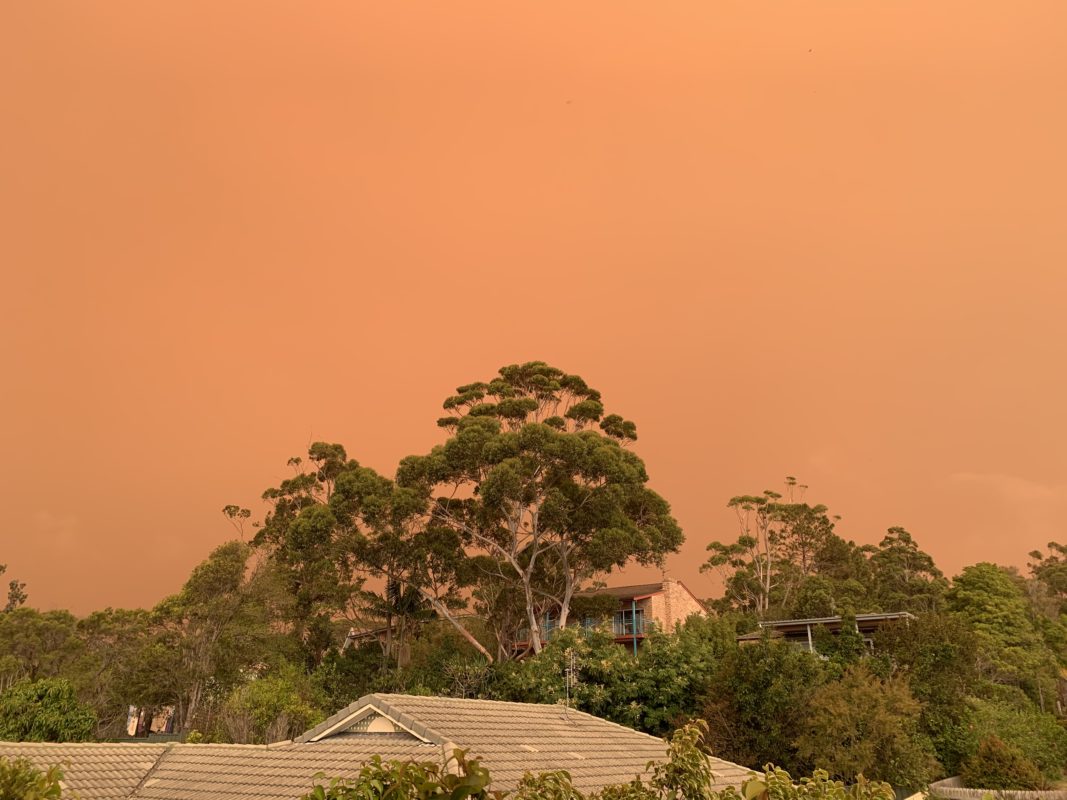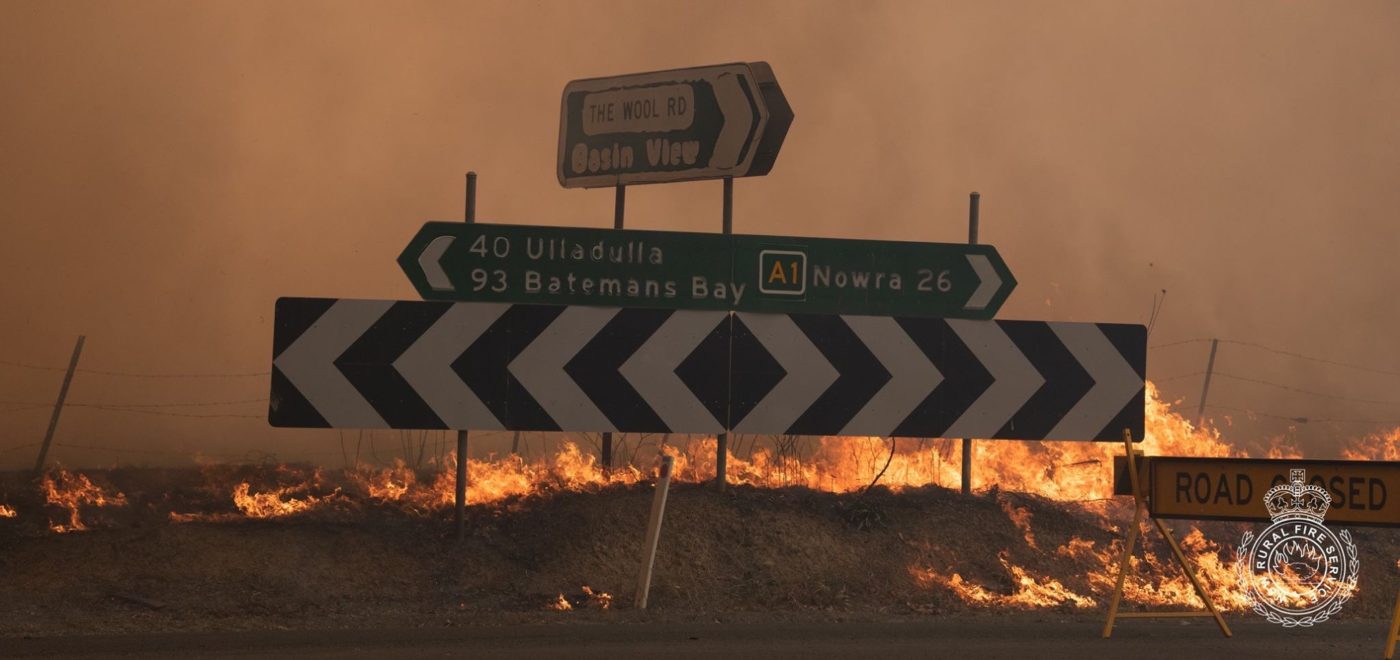HRM speaks with HR professionals and a business owner in fire-affected regions of Australia.
As many of us groaned about the idea of having to return to work after the summer break, Anna Finch, principal of Kardia HR, was experiencing something very different.
“I started to feel overwhelmed. Our team plan was to work on strategy development for Kardia and our new business, but I was not able to focus. And then the tears started. The smallest of things [set] me off,” she wrote on the company’s Facebook page.
“Never have I experienced bushfires like this, evacuated from my home like this, felt this amount of anxiety, stress and worry.”
Based in the south coast town of Nowra, Finch had to manage her fear around losing her own home to the fires (which thankfully didn’t happen) as well as checking in with her clients in the surrounding areas.
Speaking to HRM, Finch says the fires “have put an enormous amount of stress on our community.”
Her co-worker Natalie Atkin painted a picture of the atmosphere in the town.
“It’s still so smokey here. Like, if you leave a window open overnight, in the morning your house could be full of smoke.
“I’ve lived here my whole life and the coast is the driest I’ve ever seen it. As soon as they got one fire under control another one would get going. The fire near my house has been burning underground and they’re not sure when it will be distinguished. Probably not until they have a lot of heavy rainfall,” says Atkin.

Heartbreak and silence in peak season
One of Kardia’s clients, a professional services organisation, had an employee who is a volunteer firefighter. She lives in the bush, as do her parents, and when the evacuations were announced they all stayed to try and defend their properties.
“Unfortunately it didn’t go to plan,” says Finch. “Her parents are now in hospital and they lost their home, and the employee’s property was severely damaged. She obviously hasn’t returned to work yet and her employer is doing everything possible to support her.”
Though this might be the worst tragedy faced by one of her clients, it’s not as though anyone has had it easy.
“Many, many businesses in this area rely on the money they make in the summer months to get them through the colder months. This all happened in the peak period when they’d be making their top dollars,” says Finch.
A winery in Ulladulla – one of Kardia’s clients – didn’t lose property, although that was a very real possibility at one point, but a lack of foot traffic has hit them hard.
“They had just invested an enormous amount of money into upskilling their casual employee pool and then the fires hit,” says Finch. “They haven’t been able to give any shifts to this casual pool.”
Job security is a community-wide concern, says Atkin. At a restaurant she recently visited, 16 of the 20 casual staff employed for the peak season weren’t getting shifts.
“Normally it’s the kind of restaurant that you have to wait ages for to get a table. But now there’s just no one there. It’s also very quiet wherever you go.”
Finch says clients now have to get creative about how they manage overheads.
One way to do this, she says, is to offer flexible hours for staff who choose to take them. Obviously you can’t make this mandatory, but many staff would likely welcome a brief reduction of hours to manage personal matters.
“You also need to engage with your staff about creative and new ways to bring business in. You can look at making the most of online capabilities,” says Finch.
“Like the ‘spend with them’ Instagram initiative,” Atkin adds. “A lot of businesses are reporting that they’re making more money through this than they usually would be.”

Lessons from the frontline
Melissa Cox, the people and culture manager at NowChem, a chemical manufacturing company in South Nowra and another of Kardia’s clients, was lucky that none of her staff lost homes to the fires. But due to highway closures, many were unable to get into work for weeks.
“The immediate issue for us was access. A lot of staff couldn’t get into their homes because the roads were closed, or if they did get through to their houses, they couldn’t come back to work because the roads kept getting closed.
“I was lucky that I had my computer at home, so I could log in and do some work. But there are other people in our business who don’t have that ability because they work in the manufacturing section of the business, for example. So if they’re not at work, they can’t work.”
NowChem had an evacuation plan in place. If there was a fire in the building or a chemical explosion in one of the plants, they’d know exactly what to do. But they didn’t have plans in place for bushfires like this.
Cox and the executive team had to think on their feet and prioritise how they’d make sure staff were taken care of both emotionally and financially.
“We didn’t want [stranded] staff to be without pay. So we allowed those affected staff to go into negative annual leave if they needed to.”
In the aftermath of the fires, Cox and the team had to create a policy that outlined information about how to respond to a threat that doesn’t take place on site. The policy includes details like:
- Where are the evacuation centres?
- How will they help staff to get home?
- If staff can’t get home, where can they go?
- How they’ll compensate staff who are unable to physically get to work.
- Details around their duty of care to staff.
“We made this policy in consultation with staff,” says Cox. “We got them together and said, ‘Okay, this happened last week, what could we do better? What information would you have liked to have earlier than you did?’ For example, we weren’t evacuated onsite but people were wondering if we were going to be, because you could see the smoke quite heavily from our carpark.”
Cox and NowChem’s managing director were very vigilant in sourcing up-to-date information and keeping in constant contact with emergency services to ensure staff and the plant were safe at all times. But Cox admits there was room for improvement.
“From [feedback from staff] we put into the policy that if there are extreme or catastrophic weather conditions either that day, or scheduled for the next day, we will have an all staff onsite meeting as soon as possible and tell them exactly what’s going to happen,” says Cox.
“Everyone that I spoke to said they trusted us to do the right thing and evacuate the premises if that’s what needed to happen, but we could have just allayed some of their fears by giving them that information.”
Cox was glad they had the foresight to collect employee contact details and store them offsite a few months ago.
“I had a couple of people whose personal details I didn’t have, so it was good that I could check on them using that.”
Looking forward
An employer’s response to trying times can have a dramatic impact on employee relations.
“From a leadership perspective, for those leaders who have been directly impacted in one way or another by the fires, showing compassion and understanding towards staff who need time off has come easily,” says Finch.
“However, I have heard of other leaders unfortunately not showing as much compassion or understanding and either challenging the employee for asking for time off or expecting them to still be ‘on call’ if the business needs them. Personal leave is there for a reason. Employees shouldn’t feel guilty or that they’re letting their employer down for taking it in circumstances like this.”
Mental health can be a challenging topic to tackle in the workplace, but Finch says it’s a drum that employers need to beat even louder in times like this, especially when it comes to recognising when staff who have been affected are ready to return to work.
“I found a great article from Beyond Blue that I’ve been sharing with our clients to help them to notice any signs [of ill mental health] in their employees.”
Of all the people we’ve spoken to – both for this article and in general – the consistent message is that the silver lining of this whole disaster is the way in which it has galvanized our communities and brought out the most generous qualities in individuals. If you’d like to do your part to support the fire recovery efforts, click here for details
For business leaders who feel they need help in addressing mental health concerns with their staff, AHRI’s short course ‘Mental Health at Work’ can put you on the right path.


I am learning about bushfires at school.
This article helped me!
I also am the first comment yay!
🙂